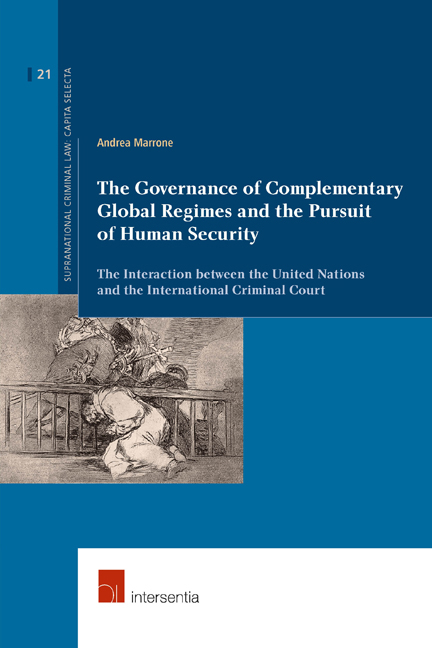 The Governance of Complementary Global Regimes and the Pursuit of Human Security
The Governance of Complementary Global Regimes and the Pursuit of Human Security In 1998 the State Parties to the Rome Statute established a treaty-based organization of universal character dealing with humanitarian crimes of international concern committed against civilians in conflict and post-conflict situations. The Rome Statute institutions are complementary to the United Nations system but independent from such an established international regime, whose aims are to facilitate the cooperation in the field of international security, international law and human rights. The emerging regime of international criminal justice constitutes arguably the most significant reform of international law, but there is still a long way ahead for systemic changes in the governance of humanitarian affairs centralizing individual rights in intra-state conflict and post-conflict situations. It remains to be seen how the concept of human security would have an impact a) on the transition of international law and international security; b) on the measures applied on the ground by complementary international mandates; c) on the role of the Security Council, State sovereignty and the international governance of humanitarian escalations; and d) on the creation of new norms and the place of non-state actors in international law. Moreover, it is also important to assess the evolution of universal jurisdiction, including the policy formulations of global threats and further definitions of serious crimes of common concern such as the crime of aggression, including their controversial governance and the application of double standards in the selection of inter-state conflict situations resulting from acts of aggression. Another aspect requiring attention is to avoid the use of the emerging regime of international criminal justice as an instrument of coercive diplomacy in the context of peace and security maintenance by those permanent members of the UN Security Council (China, Russia and the US), which so far rejected the Rome Statute partnership, but still use it occasionally when this favors their own political interests. In other words, we will look at the ingredients required and the recipe wished, if any, while advocating for democratic governance systems based on the principles of global justice and the role of public international law and its institutions consolidating human security. In this study the intersection between politics, law and institutions complementary in their nature, receives an accurate analysis proposing integrated governance models of peace, justice and security to be applied globally.
To save this book to your Kindle, first ensure [email protected] is added to your Approved Personal Document E-mail List under your Personal Document Settings on the Manage Your Content and Devices page of your Amazon account. Then enter the ‘name’ part of your Kindle email address below. Find out more about saving to your Kindle.
Note you can select to save to either the @free.kindle.com or @kindle.com variations. ‘@free.kindle.com’ emails are free but can only be saved to your device when it is connected to wi-fi. ‘@kindle.com’ emails can be delivered even when you are not connected to wi-fi, but note that service fees apply.
Find out more about the Kindle Personal Document Service.
To save content items to your account, please confirm that you agree to abide by our usage policies. If this is the first time you use this feature, you will be asked to authorise Cambridge Core to connect with your account. Find out more about saving content to Dropbox.
To save content items to your account, please confirm that you agree to abide by our usage policies. If this is the first time you use this feature, you will be asked to authorise Cambridge Core to connect with your account. Find out more about saving content to Google Drive.